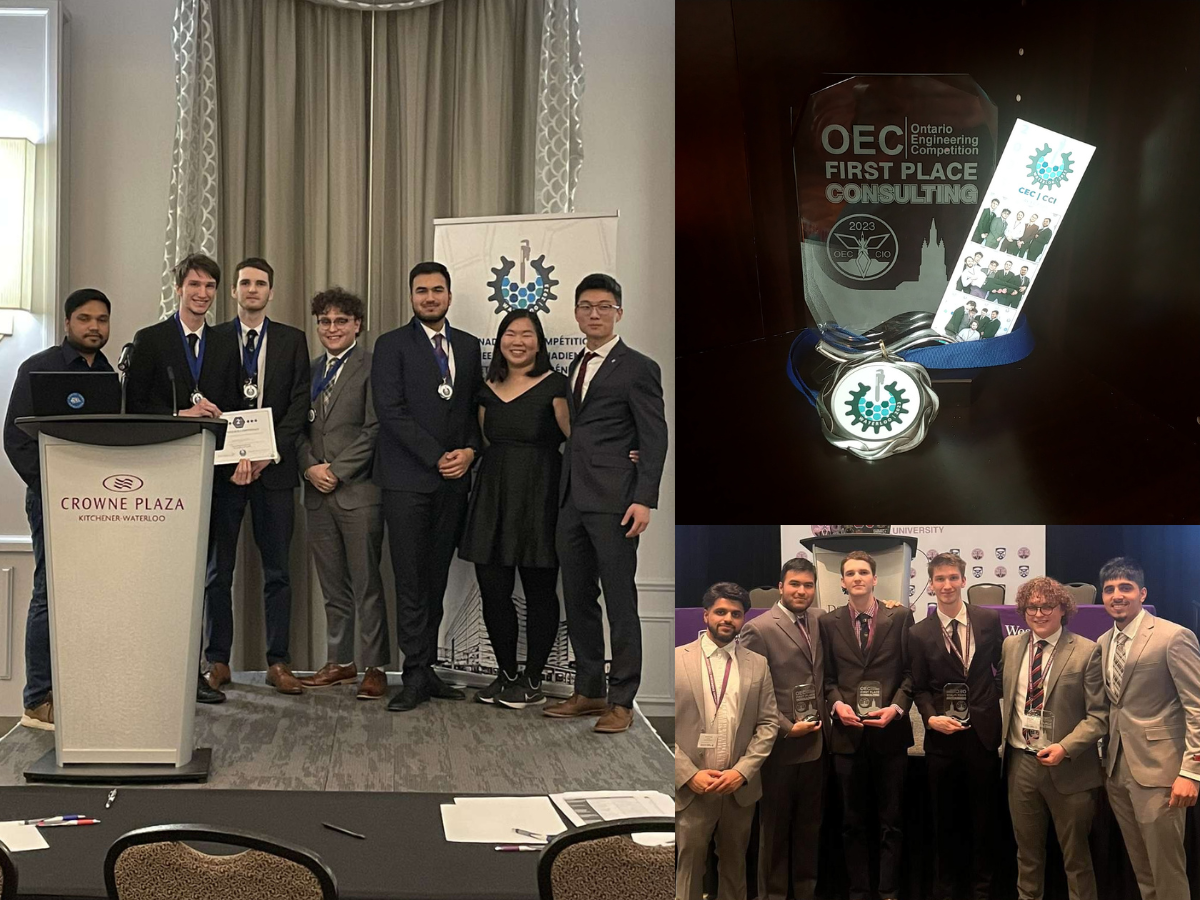Engineering Students Win Big at Provincial and National Engineering Competitions
Joseph Mathieu
Earlier this year, a team of Carleton University’s Faculty of Engineering and Design students took home first and second places at the 44th Ontario Engineering Competition and the 2023 Canadian Engineering Competition.
All are second-year engineering students who met in their first years: Jacob Angermann and Sam Elgee, both in aerospace engineering, were neighbours in residence. Through online classes and study groups on campus, they became close with Isaac Walberg, in civil engineering, and Ishaan Kambhoj, in mechanical engineering.
The four friends demonstrated strong analysis and quick problem-solving skills in two consulting engineering challenges that saw them face off against other Canadian engineering schools. Through careful consideration of the social, environmental and economic impacts of their solutions, as well as measured evidence of their feasibility, the team communicated their answers with clarity and professionalism.
Their close working relationship in a wider circle of Carleton friends is part of what allowed them to take home medals from the two competitions. While the three others joined Angermann, who wanted to compete at the Carleton Engineering Competition, he says he’s not the team leader, and that, “everyone is an equal partner with his own strengths.”

On January 20, they joined a group of Carleton engineering students on a coach bus to the Ontario Engineering Competition (OEC). They rolled into London, Ontario just before 4 p.m. for a brief pit stop at their hotel. The dress code was business casual but the Carleton Consulting Team opted for full suits. They joined the opening ceremonies among 300 students from 16 participating universities, and very soon afterward were into the competition—sequestered in a room with a whiteboard and desks.
The consulting prompt required cutting-edge and innovative thinking, as it involved an actual real estate company deciding how to build a 575,000-square-foot building. Should KingSett Capital comply with Toronto Green Standard Tier 1 requirements or go zero-carbon?
“The problem was very detailed,” says Angermann. “They supplied a lot of information on what was being planned including restrictions, limitations and cost breakdowns, which was very beneficial in determining what we should do.”
Three hours seemed to fly by as they approached the situation from every possible angle. The team determined that the building should go zero-carbon, and they wrote and edited a 10-page report and PowerPoint presentation in a blitz.
What drew the team to the consulting competition was a shared joy of problem-solving. Angermann enjoys consulting because of its focus on figuring out solutions before a build truly begins.
The team did well on their midafternoon presentation. So well that, in the evening, they were awarded first place in their category.

“When they announced our name, there was just a burst of energy,” says Angermann. “We jumped up, and we had all the other Carleton teams chanting, yelling and cheering us on. It felt like a big moment.”
Then, while they were still high with excitement from their win, another team congratulated them on “heading to nationals.” This reality sank in, and they began to prepare for the Canadian Engineering Competition (CEC). They met to review their marks from their first-place win and to research tips on how much time to spend writing a report and to practice a presentation.
A few days before the competition, organizers informed them that their CEC consulting prompt would involve industrial pollutants. They researched a variety of different industrial pollutants, learning about their uses and issues, and especially how they affect the environment.
In Waterloo on February 25, they worked hard through another eight-hour work session that started midmorning. They had to create a three-year plan for a fictional PVC plastics company that aimed to reduce industrial pollutants within a $5M budget. They were content to skip the social night of bowling to practice their presentation a few more times. The next day, they all felt the presentation went very well. Their efforts paid off with a second place out of eight competitors.
“We had higher hopes, and we were a bit disappointed, but we know we did really well. We came second in all of Canada,” says Angermann.
Angermann is hopeful that more Carleton engineering students will join to compete at OEC next year. From the categories of re-engineering to debating, from junior and senior engineering to consulting and communication category, there are interests for all streams of post-secondary engineering.
“It really gives you the chance to just throw yourself out there with a team of you and your friends,” he says. “It’ll be a fun experience—just competing and presenting the judges—and will take you even closer to real-life engineering experiences.”